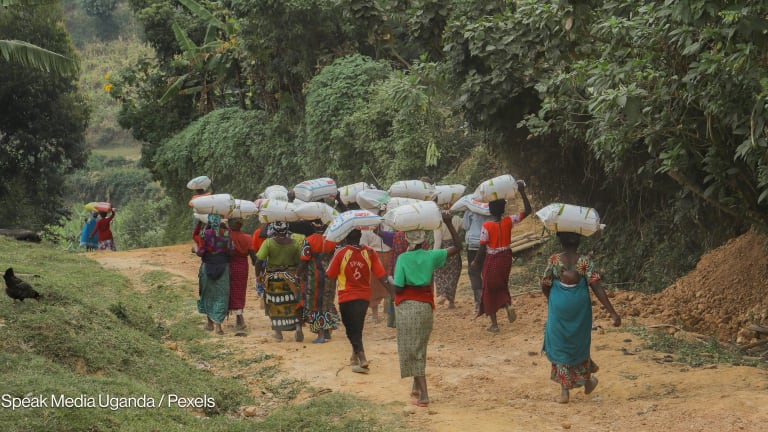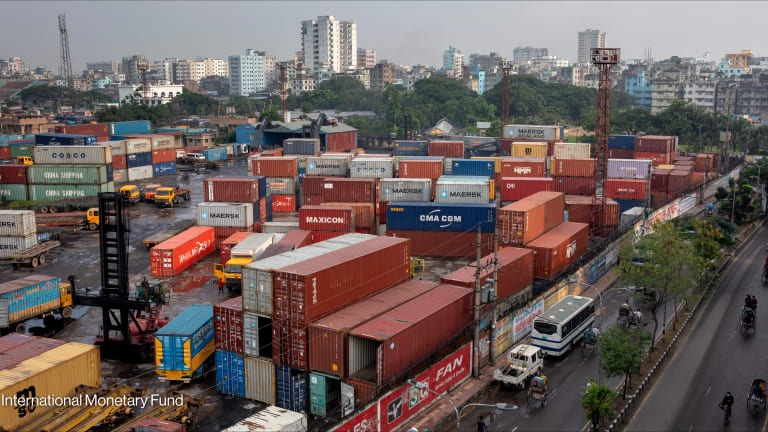
CANBERRA — News and images shared worldwide of the 2019-2020 Australian bushfires sparked global donations to assist affected communities. The human and ecological disaster between October 2019-February 2020 saw almost 13 million hectares of land burned and 1 billion animals killed. As climate change increases the likelihood of similar disasters worldwide, discussions on how countries can support nations that fall outside the rules for official development assistance are taking place.
More on development assistance:
► Japan leads surge in tied aid
► With nationalism on the rise, are aid donors becoming more selfish? (Pro)
► Opinion: Aid isn't going to the world's poorest people. Why?
In January, the United States Agency for International Development dipped into its humanitarian budget and resources to provide Australia with assistance. It deployed advisers from its Office of U.S. Foreign Disaster Assistance and provided $100,000 in humanitarian assistance support — this was in addition to assistance provided by the U.S. government via the National Interagency Fire Center, Department of the Interior, and Forest Service.
In the United Kingdom, Minister of State for the Pacific and International Environment Zac Goldsmith took the conversation further by suggesting the increasing impacts of natural disasters may require changes to ODA rules to consider the economic impact they can have on a country.
“ODA by its very definition is aid designed to promote the economic development and welfare of developing countries.”
— Tony Pipa, senior fellow in global economy and development, Brookings Institution"I would like the rules around emergencies to be completely changed, and have been pushing for that,” he told The Telegraph this past January. “The rules are not national — they are international, and harder to change. There are all kinds of things wrong with them.”
Currently, ODA rules count official flows to countries and territories on the Organisation for Economic Co-operation and Development’s Development Assistance Committee’s list of ODA recipients and multilateral institutions. These flows need to be concessional, with a focus on the promotion of the economic development and welfare of low- and middle- income countries.
"For example, if a reasonably well off Caribbean country is destroyed by hurricanes, we cannot step in unless it was eligible for ODA before the disaster — even though the disaster itself might have plunged the place into desperate poverty,” Goldsmith said.
Changing ODA rules
The conversation around these changes has been happening for some time. The U.K. first proposed it in 2017, after some of its overseas territories in the Caribbean were badly damaged by Hurricane Irma. Criticized for its slow response, the government said it should be able to spend from aid pots in such circumstances — despite the islands being too wealthy to qualify for ODA.
The proposal was eventually dropped after failing to garner support from DAC members, but the rules were instead changed to allow countries to become reeligible for ODA if a disaster pushed their income down to below World Bank-defined “high-income levels” for one year.
An OECD spokesperson told Devex that DAC is reviewing proposals developed by the OECD secretariat in 2017 which could expand the list of countries receiving assistance in exceptional circumstances.
These changes are in response to a call from the DAC at a 2017 high level meeting for “a process to examine short-term financing mechanisms available to respond to catastrophic humanitarian crises in recently graduated high-income countries, including, without prejudice, a possible role for ODA spending based on objective criteria while ensuring no diversion of resources from existing ODA recipients.”
“The United States has participated in those discussions,” a spokesperson for USAID confirmed, but said USAID does not support extending ODA eligibility to any country that has sustained World Bank high-income status for three consecutive years.
Modernization of ODA has been a work in progress since 2012, with the sustainable development goals sparking further action.
But changes are slow: Among those implemented, ODA has moved from a cash flow to a grant equivalent system — agreed to in 2014 and first reported in 2019. Ways to account for private finance instruments and debt relief are among the changes still under discussion, according to an email published from DAC Chair Susanna Moorehead.
With regards to requests for ODA changes directly in response to the Australian bushfires, or other global emergencies such as COVID-19, “ we have not received any formal requests ... to look at expanding emergency ODA outside the official recipient list, and there have been no formal discussions on this within the DAC,” an OECD spokesperson said.
Supporting countries beyond ODA
In the U.K., Goldsmith’s views on ODA rule changes have not been shared more broadly within his own government. Heather Wheeler, former parliamentary under-secretary of state for foreign and Commonwealth affairs, said alternative methods of support would have to be investigated for high-income countries in response to questions of assistance on Jan. 9.
“Interestingly, DFID [the Department for International Development] official development assistance money is being used particularly in Brazil to look at decarbonizing its energy production,” she said. “We cannot use ODA money for Australia because obviously it is a ‘first-world’ nation, but perhaps we can find another way through the Prosperity Fund or something like that,” she added.
Reporting of assistance provided beyond ODA is also important, to ensure tax payers understand where their money goes but also that ODA reporting remains consistent between countries.
“The United States does not receive an ODA appropriation, or subscribe to an ODA target, so we have flexibility in source of funds and in how we report,” a spokesperson for USAID said.
“The United States will report the assistance to Australia in our reporting under the International Aid Transparency Initiative when the expenditure data are available in our systems,” the spokesperson added — including it in USAID’s annual report to Congress, entitled Overseas Loans and Grants, and made available on USAID’s Foreign Aid Explorer website.
As these sources are commonly used to analyse aid assistance from donors, understanding the changes support for countries such as Australia has on the data will be important to accurately represent ODA versus non ODA figures.
Maintaining ODA for low-income countries
Webinar: Funding insights — 5 years of climate funding (Pro)
In this webinar, Devex analysts explore climate-related, bilateral ODA funding flows — highlighting trends in recipient locations, funding volume, sectors of funding, and prominent projects.
Despite the expectation that climate change will continue to impact high-income countries, Tony Pipa, a senior fellow in global economy and development with the Brookings Institution, told Devex the economic and social impacts are anticipated to be far greater in LMICs. Because of this he believes ODA rules need to remain for these countries.
“ODA by its very definition is aid designed to promote the economic development and welfare of developing countries,” he said. “As a high-income country, any assistance to Australia would not fit the definition. That’s not to say that countries such as the U.S. will or should refrain from providing assistance to Australia in times of great need — it’s just that it won’t and shouldn’t be classified as ODA.”
Any changes to ODA, Pipa said, should be in enabling it to incentivize high-income and donor countries to be more ambitious in helping low- and middle-income countries adapt to the effects of climate change and support those populations when they are affected.








